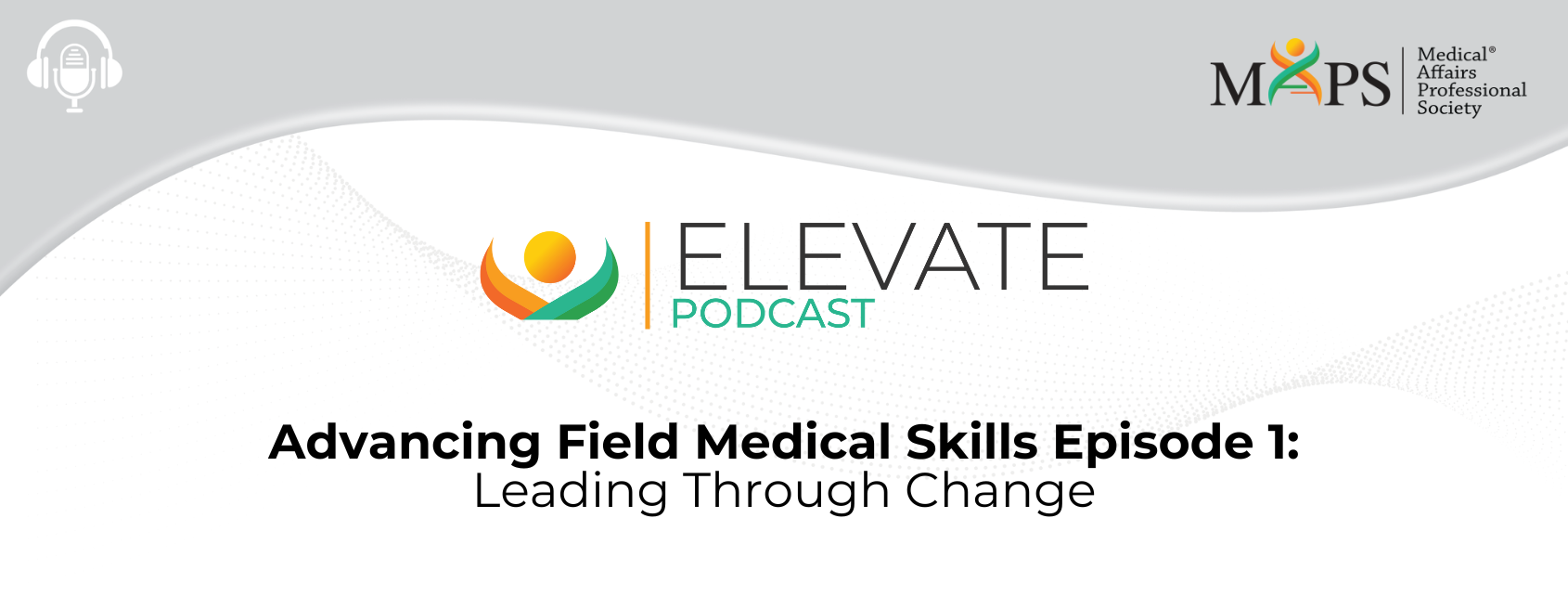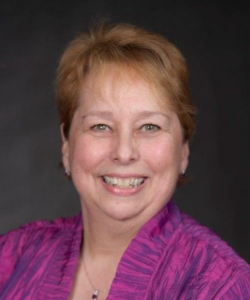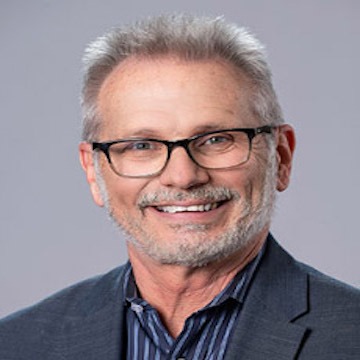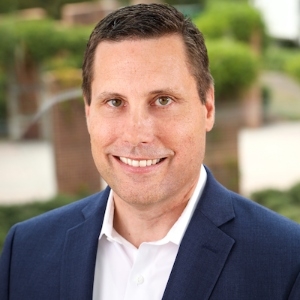Advancing Field Medical Skills
Episode 1: Leading Through Change
Speaker: Kathryn Gann, PhD
Speaker: Ralph Rewers, PhD
Speaker: David Onks, ACC
The objectives for this series of podcasts are that at the end of this series, you will be able to immediately implement one to two actions that will enhance your skills and to work more effectively within a variety of situations.
In today’s episode, our Field Medical experts will discuss tips to understand how you can lead through change.
Following is an automated transcription provided by otter.ai. Please excuse inaccuracies.
Kathryn Gann 00:00
Welcome to the Medical Affairs Professional Society Field Medical Focus Area Working Group’s podcast series entitled, advancing Field Medical skills. In this series, we will be highlighting skills, topics and behaviors that are fundamental to Field Medical success. In this first podcast we will discuss leading through change. I’m Kathryn Gann. I’m a member of the Field Medical focus area working group, and I’ll be the moderator for this podcast. Currently, I’m an independent consultant in Medical Affairs. Having spent my 30-year career as an MSL manager, and an MSL trainer and mentor. Our legal disclaimer is the views expressed in this recording are those of the individuals and do not necessarily reflect on the opinions of MAPS, or the companies with which they are affiliated. This presentation is for informational purposes only, and is not intended as legal or regulatory advice. We encourage you to engage in conversations about Field Medical with other MAPS members via MAPS Connect on the MAPS website or the mobile app. Simply log in with the email address and password associated with your MAPS account and access the global community. Then click on the discuss tab and scroll down to Field Medical Subject Area to post a question or review previous postings. The objectives for this series of podcasts are that the at the end of this series, the participant will be able to one immediately implement one to two actions that will enhance their skills and to work more effectively within a variety of situations. I’d like to thank today’s panelists for sharing their subject matter expertise with the MAPS membership. Speaking today are Ralph Rewers, Senior Director, Head Global MSL Excellence Oncology at AstraZeneca. Ralph will be our interviewer. And David Onks, founder of Spark coaching. David is our interviewee. And at this point, Ralph, I’m going to turn it over to you and perhaps you can kick us off by telling us a little bit about yourself, your background and what you do.
Ralph Rewers 02:12
Thanks, Kathy. Appreciate the introduction. So for my perspective, I’m Ralph Rewers. I’m the co-chair of the MAPS, Field Medical Focus Area Working Group. And I’m also my day job as the Senior Director, Head of Global MSL Excellence in Oncology at AstraZeneca. I’ve been in this field for about 28 years now joining and stayed in the Field Medical function my entire career. And I’m very much looking forward to this particular podcast. With that I’m going to give David an opportunity to give an overview. So David, please.
David Onks. 02:47
Thanks, Ralph. So as you mentioned, my name is David Onks. And I have been involved in the pharmaceutical industry for about 26 years now in the corporate world itself for 23. And then I left and formed spark professional coaching, which really helps people who are experiencing a pivot point in their career, they’ve just been promoted, they’ve changed jobs, or they’re even trying to figure out what they want to be when they grow up. I help them really to define that vision, clarity and give them direction on where they want to go. And that’s what I love to see as those aha moments when people craft that plan and start achieving objectives.
Ralph Rewers 03:24
Thanks, David, appreciate that. Can’t wait to get started. So let’s jump right in. So one of the things we all know having been an industry is that and really in life, that change is constant. And it’s one of the reasons why as I mentioned, I’ve stayed in in the Field Medical portion of Medical Affairs for 28 years. What was done 28 years ago doesn’t even remotely resemble what is happening today. So if you can, could you give a couple of tips for helping our audience understand how to lead through this change?
David Onks. 04:00
Absolutely. I mean, I think the first thing is recognizing what the change is. And we’re talking about leaders. So these are people that are going to be creating that environment where it’s psychologically safe for their people to follow behind them. And so you have to understand how you’re presenting coming across. You need to be sincere, empathetic, and reliable. The biggest thing I can probably say is build that trust and rapport because in order to lead people through they have to trust you.
Ralph Rewers 04:35
Thanks, David. Appreciate that. That goes a long way. I know there’s many books been written on the Speed of Trust and and building that trust. But you know, everyone goes through changes slightly differently and maybe at different paces. So any ideas about how our leaders can help their teams lead through that change?
David Onks. 04:53
Yeah, and and that truly is a great question, Ralph. Because one size does not fit all. And so, as a leader, you have to understand where each individual is in at any particular time. And with that, it’s understanding what’s happening in their professional life. But it’s also understanding what’s happening in their personal life. Because, you know, a lot of people talked about work life balance, well, actually, it’s really life balance, you know, it’s not just work that you have to balance with your life. It’s everything else that happens around it. And over the last two years, three years, we’ve seen lots of change that’s happened, and how do we create that balance? What are people going through in that any particular moment, so that a leader can then help them understand what are the things that someone may need? And also, another way to help them is what are the things that motivates that particular individual? What helps drive them what will help get them over that activation energy in that initial hump of trying to get moving to go forward and get through change.
Ralph Rewers 06:03
Terrific, thanks. Thanks, David. You know, many organizations, we spend a lot of time when there is an organizational change, we spend a lot of time with determining what the change will be, and how structurally we’ll move things. But oftentimes, we spend very little time on the change management process. Can you speak a little bit to that?
David Onks. 06:26
Yeah, that was very common in my my previous career. And part of that is because leadership, depending on which level tends to be operating at a strategic level, many instances, they take a hammer approach that people just need to adopt this change and move on. When in fact, as I say, there are so many things that are happening in that individuals lives, just saying that doesn’t necessarily work. As a parent of children, I recognize that I can’t just tell my kids to, you know, take it and move on, it’s not the way that you’re going to get people to do things, you really have to understand what it is it’s going to move them, the organization itself has to build a program around it to help the change. And the other big piece of it is really making sure that people that are being impacted by the change are also part of the change there part of the solution.
Ralph Rewers 07:27
Very, very well fed, you know, changes there’s, there’s been a plethora of resources and books written about change, because, again, this is kind of a constant process we go through, not only in business, but of course in life. Are there any ideas about if someone wants to take a look at some further reading or research on the topic, any tips about some things that you have found invaluable from your experience?
David Onks. 07:58
I can mention a couple of books. I mean, the classic one is Who Moved My Cheese. But another, more updated one, that’s actually I keep going back to is it’s called our iceberg is melting by John Kotter, and Holger craft Gerber. And the interesting thing about that one, it basically goes through a bunch of Emperor penguins on an iceberg. And as the iceberg melts, you know, penguins are going about their business. And there’s just one individual or one penguin that seems to notice that something’s not quite right. And it’s interesting as I start to look at cultural things in that as well. It’s not just about change, but it’s about how that particular penguin is treated. Right. And I think about diversity inclusion initiatives that go on. So there’s many different veins, not just change that I think that that’s a really good book, and somewhat humorous to go through. Another one that I’d recommend is it’s the updated version of managing transitions. It’s called Making the most of change by William Bridges and Susan bridges. And I really liked that one from the philosophical perspective, and also the psychological perspective. The reason I say the updated version is because they actually give examples and they give case studies within within the book of things that are practical and things that everyone can relate to. So those are some references that I would definitely recommend Ralph.
Ralph Rewers 09:28
Oh, thanks, David. I really appreciate that. You know, we’re nearing the end of our time on the podcast. It’s just been an absolutely wonderful, wonderful time to be spent here. Any final takeaways you’d like to give to our listeners today?
David Onks. 09:43
I think from the perspective of, you know, this one’s targeted at field staff, I think from the perspective of the field staff recognize that many of the field staff have have been in a remote setting. Now granted, we’re three years in and people are used to it. But actually the big change now is People are going back into the office. So again, it’s thinking about what are the dynamics that happen to the people that are your your in house staff? What are they going through as they experienced the change of going back into the office? And then having the field staff recognize that? Okay, we’re the ones that are back to being remote and how does that work? And so it’s understanding what changes others are going through in relation to the changes that you’re going through to help navigate through that experience.
Ralph Rewers 10:33
Great advice. Thanks, David. I really appreciate it. And time is flown by and so it is time to wrap up. So with that, I’m going to turn it over to Kathy to wrap things up.
Kathryn Gann 10:42
Well, thank you, Ralph and David, that was really spot on, it was I think, very much leading through change. It will be very helpful to not only field leaders, the managers, but also the individual contributors, because we all know that we look at our teammates as MSLs. And there’s often somebody who is a leader on that team. And all these things, David, that you were talking about, about being sincere and empathetic and reliable, and trustworthy. And really helping your teammates whether that’s your direct reports, or you know, they’re on the same reporting line, you are helping them understand what’s going on, I think that we people should really be able now to implement our learning objectives after listening to you there should be one to two actions that they can actually take and enhance their own skills in their day to day work environment. So thank you very much that was really spot on. So this has been our first podcast in the series on the topic of advancing Field Medical skills. If you’re a MAPS member, thank you for your support of MAPS. If you’re not yet a MAPS member and would like to would like access to additional resources in this area. Please visit the MAPS website to explore joining. And that website is Medical Affairs.org forward slash membership. This concludes the podcast






